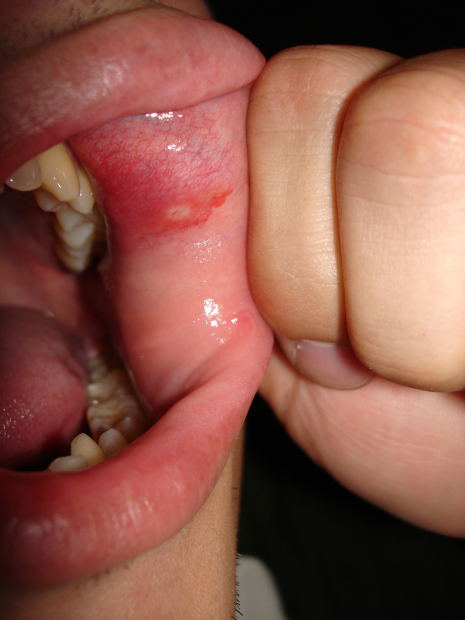Mouth Ulcers: Symptoms, Causes and Natural Remedies
Mouth Ulcers in Children: Causes, Symptoms, Natural Remedies and Diet

What Is a Mouth Ulcer and How Does It Appear?
A mouth ulcer, or aphtha, is a painful but non-contagious lesion of the oral mucosa caused by minor injuries or irritation. It can appear on the inside of the cheeks, gums, lips, or tongue. These mouth ulcers are usually small (2–3 millimeters), but in some cases, they can grow larger than 1 centimeter in diameter. When multiple or recurrent ulcers are present, the condition is known as aphthous stomatitis.
This disorder is very common, especially among children and adolescents up to age 20 and it tends to affect women more frequently
Symptoms of Mouth Ulcers
Mouth ulcers often begin with a tingling or itching sensation in a specific spot inside the mouth. Within a day or two, the area becomes red and a small blister may form. When the blister breaks, it leaves behind a round, white or yellowish sore with a red border. The ulcer may darken slightly as it heals. These lesions are usually very painful, especially when touched or irritated by food, brushing, or talking.
Healing typically takes 7 to 10 days, but in some cases, it can take up to 30 days.
Interesting fact: If your child starts drinking more frequently than usual, it might be a sign of a mouth ulcer. Since children under age four often struggle to express pain or discomfort, they may instinctively seek relief from cold drinks. Many parents worry about excessive thirst and associate it with diabetes, but in many cases, a simple mouth ulcer may be the cause.
Causes of Mouth Ulcers
The exact cause of mouth ulcers is still unknown, but several physical, psychological and nutritional factors are associated with their occurrence:
-
Physical factors:
-
Weakened immune system (e.g., after a cold, flu, fever)
-
Excessive physical fatigue
-
Oral injuries (from dental appliances, aggressive brushing, etc.)
-
Antibiotic treatments
-
Hormonal fluctuations (e.g., during menstruation)
-
-
Psychological factors:
-
Stress
-
Anxiety
-
Depression
-
-
Nutritional factors:
-
Deficiencies in iron, zinc, vitamin B12 (found in meat, fish, especially liver) and folic acid (vitamin B9, found in leafy greens and legumes)
-
Excessive consumption of certain foods such as alcohol, spicy foods, chocolate, sweets, cheese, nuts, animal fats and very hot foods or drinks
-
-
Smoking
Treatment, Prevention and Natural Remedies for Mouth Ulcers
Mouth ulcers typically heal on their own and since their exact cause is often unknown, there’s no universal treatment. However, there are effective remedies to relieve pain and accelerate healing.
Medical Treatments
Your healthcare provider may recommend topical or systemic medications, such as corticosteroids, antimicrobial mouthwashes, or pain-relief gels, based on your specific condition.
Natural Remedies for Mouth Ulcers
In addition to good oral hygiene, several natural solutions can help soothe pain and promote healing:
-
Improve your diet:
Consume foods rich in vitamin B12, folic acid (B9), iron and zinc. If needed, ask your doctor whether supplements, particularly B-complex vitamins, might be helpful. -
Reduce physical and emotional stress:
Ensure adequate rest, limit intense physical activity and incorporate relaxation techniques such as meditation, breathing exercises, or yoga. -
Black tea bag compress:
Apply a wet black tea bag directly to the ulcer. The tannic acid in tea has natural astringent and anti-inflammatory properties that can speed up healing. -
Aloe Vera gel:
Aloe Vera is known for its soothing, antiseptic, cooling and healing properties. Apply a small amount of pure Aloe Vera gel directly onto the ulcer. It will create a protective film and promote tissue repair. Many over-the-counter products for mouth ulcers are Aloe-based. -
Tea Tree Oil:
Dab a tiny amount of Tea Tree essential oil directly onto the sore using a clean cotton swab. Its antibacterial and antifungal properties can help reduce inflammation and prevent infection. -
Echinacea mouth rinses:
Gargling with an echinacea herbal infusion (or diluted tincture) can support immune function and soothe oral tissues. -
Honey:
Apply a small amount of organic honey on the ulcer two to three times a day. Honey has antibacterial, anti-inflammatory and healing properties. -
Coconut oil:
With natural antimicrobial and soothing effects, applying coconut oil directly to the sore can help reduce pain and speed up healing. -
Sage and chamomile rinses:
Prepare a warm mouth rinse using sage or chamomile tea, both known for their anti-inflammatory and antiseptic properties. Use this rinse 2–3 times a day. -
Licorice root extract (DGL):
Deglycyrrhizinated licorice (DGL) can be used as a mouthwash or lozenge to reduce pain and inflammation and promote healing of the mucosa.
⚠️ Before using any herbal or essential oil remedy, make sure you are not allergic and consult your healthcare provider, especially for children or if pregnant.
Foods to Avoid When You Have a Mouth Ulcer
To reduce irritation and speed healing, avoid the following:
- Sugary foods and chocolate
- Alcohol and coffee
- Spicy foods and strong spices
- Animal fats and aged cheeses
- Hot foods and drinks
- Cigarette smoke
- Acidic foods, such as vinegar and citrus fruits (oranges, lemons, etc.)
